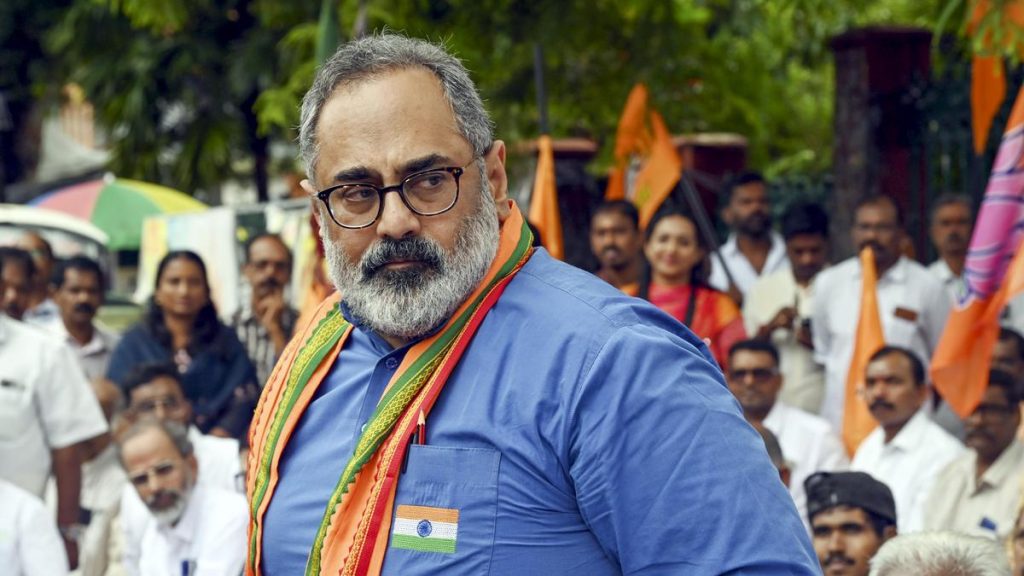Listen to the article
In a sharp critique of the Kerala government’s poverty eradication claims, BJP state president Rajeev Chandrasekhar has attributed the reduction in extreme poverty in Kerala to centrally sponsored schemes rather than state initiatives.
Speaking at a press conference on Monday, Chandrasekhar dismissed the Left Democratic Front (LDF) government’s recent celebration of eliminating extreme poverty as “mere propaganda,” questioning both the timeline and expenditure involved in the state’s poverty reduction efforts.
“The extreme poverty level in Kerala was 1.24%. Why did the government take over 10 years to eradicate this? Why was over ₹1,000 crore spent for this purpose?” Chandrasekhar asked, contrasting the state’s performance with what he described as more significant achievements at the national level.
He pointed to the Narendra Modi government’s record at the Center, claiming it had reduced extreme poverty across India from 16.2% to 2.3% during the same period. According to Chandrasekhar, this represents approximately 170 million Indians lifted out of extreme poverty nationwide, compared to just 272,000 people in Kerala.
The BJP leader specifically credited several flagship central government programs with driving poverty reduction in Kerala, including the Pradhan Mantri Awas Yojana (affordable housing scheme), Pradhan Mantri Garib Kalyan Anna Yojana (food security program), and Ayushman Bharat (national health protection scheme).
Kerala has long maintained some of India’s best human development indicators, including relatively low poverty rates compared to other states. The LDF government recently announced complete eradication of extreme poverty, presenting it as a milestone achievement resulting from targeted state interventions and social welfare programs.
However, Chandrasekhar’s comments highlight the ongoing political tension between Kerala’s left-leaning state government and the BJP-led central government, with both claiming credit for social welfare improvements.
Poverty measurement and eradication claims have become increasingly contentious in Indian politics. The debate often centers on methodology—whether to use consumption-based measures, multidimensional poverty indexes, or income-based approaches—and on which level of government deserves credit for improvements.
Kerala’s poverty reduction strategy has typically involved a mix of universal public services, targeted interventions for vulnerable groups, and extensive social security programs. The state has historically invested heavily in education, healthcare, and social welfare, creating what some economists call the “Kerala model” of development.
The central government, meanwhile, has emphasized direct benefit transfers, targeted subsidies, and large-scale nationwide schemes to address poverty, particularly in its more acute forms.
Economic analysts note that poverty reduction typically results from multiple factors working together, including state and central government programs, economic growth, remittances (particularly significant in Kerala’s case), and private sector employment.
The political back-and-forth over poverty statistics comes ahead of upcoming local elections in Kerala, where the BJP is attempting to strengthen its position in a state traditionally dominated by the LDF and the Congress-led United Democratic Front (UDF).
As both the central and state governments continue to claim credit for social welfare improvements, the debate underscores the complex interplay between different levels of governance in India’s federal structure, especially in policy areas like poverty alleviation where responsibilities are shared.
Verify This Yourself
Use these professional tools to fact-check and investigate claims independently
Reverse Image Search
Check if this image has been used elsewhere or in different contexts
Ask Our AI About This Claim
Get instant answers with web-powered AI analysis
Related Fact-Checks
See what other fact-checkers have said about similar claims
Want More Verification Tools?
Access our full suite of professional disinformation monitoring and investigation tools




11 Comments
The debate around Kerala’s poverty reduction efforts highlights the political tensions in India. While the state government celebrates its achievements, the BJP seems intent on undermining those claims and attributing the progress to central initiatives.
This partisan bickering is unlikely to help the people who are actually struggling with poverty. A more collaborative and data-driven approach would be more constructive.
It’s interesting to see the BJP’s perspective on Kerala’s poverty reduction claims. While the state government touts its achievements, the opposition is quick to credit the central government’s initiatives. I wonder if there’s room for nuance in this debate.
Poverty is a complex issue, and it’s not always easy to attribute progress to specific policies or government programs. A more holistic analysis would be helpful to understand the full picture.
The numbers and statistics being thrown around are quite staggering. Lifting 170 million Indians out of extreme poverty nationwide is an impressive feat, though the details behind these claims would need closer examination.
It’s good to see the opposition holding the government accountable on these claims. Transparency and rigorous analysis are crucial when it comes to poverty reduction efforts.
The debate around Kerala’s poverty reduction efforts highlights the need for transparent and accountable governance, regardless of which party is in power. Rigorous data analysis and independent verification would help inform a more constructive dialogue.
While the BJP’s claims about the central government’s achievements in poverty reduction are impressive, it’s important to remember that poverty is a complex, multifaceted issue that requires a comprehensive approach. Simplistic comparisons may not tell the whole story.
The BJP’s criticism of Kerala’s poverty reduction efforts seems to be more about political positioning than a genuine concern for the welfare of the people. A more constructive dialogue focused on solutions would be more meaningful.
Poverty is a persistent challenge, and it’s important to critically examine claims of success, regardless of which political party is making them. A nuanced, evidence-based discussion would be more productive than partisan point-scoring.
Interesting to see the BJP leader questioning the timeline and expenditure involved in Kerala’s poverty reduction efforts. The numbers being cited by both sides warrant closer scrutiny to get a clearer picture of the ground realities.